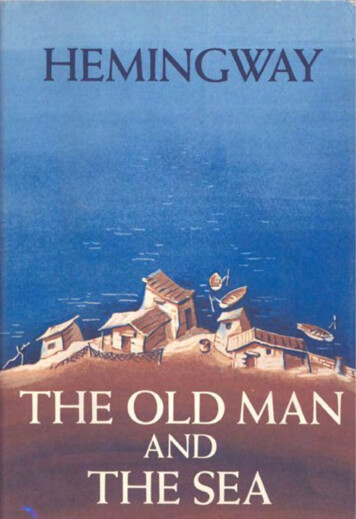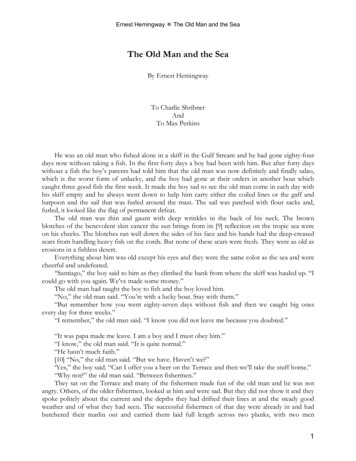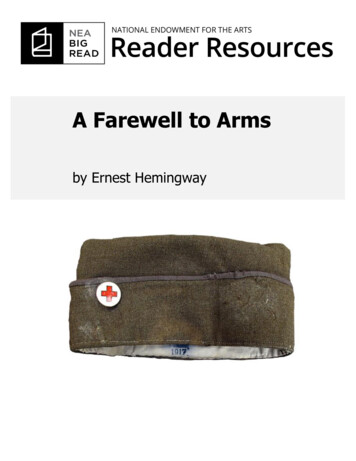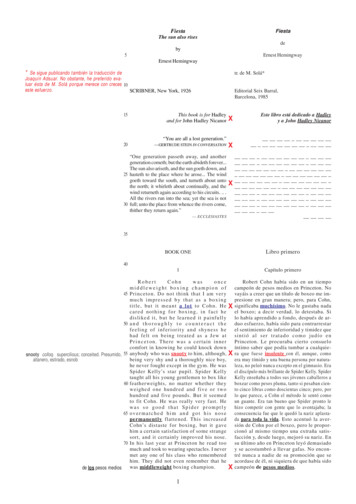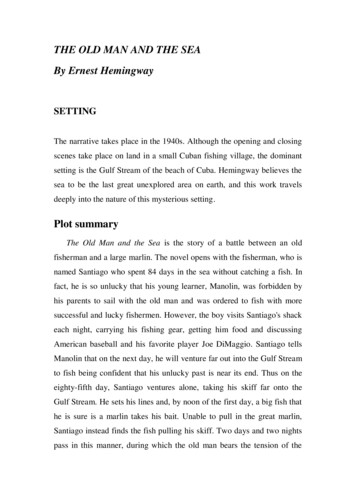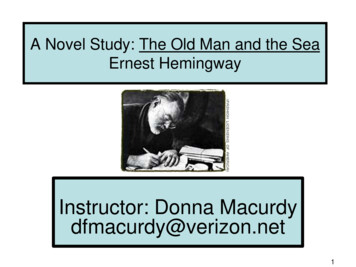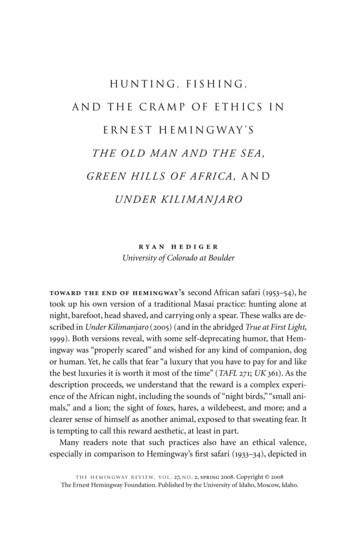
Transcription
Books by Ernest HemingwayTHE COMPLETE SHORT STORIESTHE GARDEN OF EDENDATELINE: TORONTOTHE DANGEROUS SUMMERSELECTED LEITERSTHE ENDURING HEMINGWAYTHE NICK ADAMS 'STORIESERNESTHEMINGWAYISLANDS IN THE STREAMTHE FIFTH COLUMN AND FOUR STORIES OF THE SPANISH CIVIL WARBY-LINE: ERNEST HEMINGWAYA MOVEABLE FEASTTHREE NOVELSTHE SNOWS OF KILIMANjARO AND OTHER STORIESTHETHE HEMINGWAY READERTHE OLD MAN AND THE SEAACROSS THE RIVER AND INTO THE TREESGARDENFOR WHOM THE BELL TOLLSTHE SHORT STORIES OF ERNEST HEMINGWAYTO HAVE AND HAVE NOTGREEN HILLS OF AFRICAOF EDENWINNER TAKE NOTHINGDEATH IN THE AFfERNOONIN bUR TIMEA FAREWELL TOARMSWITH A PREFACE BYCHARLES SCRIBNER, JR.MEN WITHOUT WOMEN. THE SUN ALSO RISESTHE TORRENTS OF SPRINGSCRIBNERNEW YORK LONDON TORONTO SYDNEY
Publisher's NoteSCRIBNER12.30Avenue of the AmericasNew York, NY 1002.0This book is a work of fiction. Names, charaCters, places, andincidents either are products of the author's imagination or areused fictitiously. Any resemblance to actual events or locales orpersons, living or dead, is entirely coincidental.Copyright 1986 by Mary Hemingway, John Hemingway,Patrick Hemingway, and Gregory HemingwayPreface copyright 1987 by Macmillan Publishing Company, adivision of Macmillan, Inc.All rights reserved,including the right of reproductionIn whole or in part in any fonn.First Scribner trade paperback- edition 2003SCRIBNER and design are trademarks of Macmillan UbraryReference USA, Inc., used under license by Simon & Schuster,the pu lisher of this work.For infonnation regarding special discountS for bulkpurchases, please contact Simon & Schuster Special Sales:1-890-456-6798 or business@Simonandschuster.co!llManufactured in the United States of America23 25 27 29 30 28 26 24 22Library of Congress .Cataloging-in-Publication DataHemingway, Ernest, IBgg--Ig6I.The Garden of Eden I Ernest Hemingway; with a preface byCharles Scribner, Jr.-1st Scribner Pap,erback Fiction ed.p. cm.I. Man-woman relationship-France-Riviera-Fiction.2. Married people-France-Riviera-Fiction.l. Title.PS3515.E37G37 1995ISBN-13: 978-0-684-80452-1ISBN-IO:0-684-80452-2As was also the case with Hemingway's earlier posthumouswork Islands in the Stream, this novel was not in finished fonnat the time of the author's death. In preparing the book forpublication we have made some cuts in the manuscript and someroutine copy editing corrections. Beyond a very small number ofminor interpolations for clarity and consistency, nothing has beenadded. In every significant respect the work is all the author's.
Prefaceby Charles Scribner, Jr.UP TO THE TIME of his death in 196J Ernest Hemingway wasworking on a number of writing projects, all of which were nearenough to completion to be edited and published posthumously. I remember his widow, Mary, c ming to my office witha large shopping bag filled almost to bursting With photocopiesof unpublished writing left by her husband. This may have beenone of the richest colIections of literary material ever delivered,in so informal a manner. In addition to a number of sketchesand fragments of stories and some completed stories, the bagcontained the typescripts of three major works: a novel set inBimini and Cuba, later published under the title Islands in theStream, the original transcript of Hemingway's bullfightingjournal, 1he Dangerous Summer, and a major work of fiction towhich Hemingway had given the title The Garden of Eden.This last work was filled with so many remarkable riches that,in spite of the fact that Hemingway never completed it, we wereconvinced that it should be published. Only the second partwas incomplete, and tHe first half taken by itself, with only amodest amount- of pruning, provided, a whoUy hannonious andcoherent narrative.
viiiPrefaceUpon publication of the novel, our judgment in bringing outthe book as we did was confirmed by its success all over theworld and by the many positive responses of leading critics.For many readers familiar with Hemingway's other works, TheGarden of Eden may seem to be a departure from his usual'themes, in so far as it presents an intensive study of the mentalstate of an intelligent woman uncontrollably envious of her hus·band's success as a writer and yearning to change her gender.But the conception of Hemingway as a writer primarily ab·sorbed with external action fails to take into account his profound interest in character. On the surface, many of his storiesmay seem to deal with exciting physical events, but, like Con·rad, he was always primarily interested in the effect such eyentshad in the minds of the individuals concerned. As a wnter"hewas a gifted student of human behavior. Mary Hemingway oncetold me that he had the uncanny knack of being able to enter aroom full of people and almost immediately divine the relation·ships among them.'In almost all of his stories, from the earliest ones that dealwith his boyhood to the great later works of fiction, one can al·ways find the interplay of character under the surface of the ac·tion. His brief character studies in A Moveable Feast areadditional instances of that preoccupation.I remember his annoyance when I once suggested to him that'it might be useful to teachers if we published an edition of TheOld Man and the Sea with the original version that had appearedas a short story in Esquire many years before. For some time Iwondered about his reaction until I finally realized that for Hem·ingway every story .had an inside and an outside. The outsidemight be the basis for a good yarn, as it was in the Esquire shortstory, but only its inside, revealed by the thoughts of the old manin the final novella, could be the basis for a work of literature.In The Garden of Ed n, the careful reader will find such de·lights and revelations.BOOK ONE
Chapter One.THEY WERE LIVING at Ie Grau du Rai then and the hotel was on,a canal that ran from the walled city of Aigues Mortes straightdown to the sea. They could see the towers of Aigues Mortesacross the low plain of the Cam argue and they rode there on,their bicycles at some time of nearly every day along the whiteroad that bordered the canal. In the evenings and the morningswhen there was a rising tide sea bass would come into it andthey would see the mullet jumping wildly to escape from thebass and, watch the sweJling bulge of the water as the bass attacked.A jetty ran out into the blue and pleasant sea and they fishedfrom the jetty and swam n the beach and each day helped thefishermen haul in the long net that brought the fish up onto thelong sloping beach. They drank aperitifs in the cafe on the corner facing the sea and watched the sails of the mackerel fishingboats out in the Gulf of Lions. It was late in the spring and themackerel wer running and ,fishing people of the port were verybusy. It was a cheerful and friendly town and the young couple
Ernest Hemingway4liked the hotel, which had four rooms upstairs and a restaurantand two billiard tables downstairs facing the canal and the lighthouse. The room they lived in looked like the painting of VanGogh's room atAdes except there was a double bed and two bigwindows and yOll could look Qut across the water and the marshand sea meadows to the white town and bright beach of Palavas.They-were always hungry but they ate very well. They werehungry for breakfast which they ate at the cafe, orderingbrioche and cafe au lait and eggs, and the type of preserve thatthey chose and the manner in which the eggs were to be cookedwas an excitement. They were always so hungry for breakfastthat the girl often had a headache until the coffee came. But thecoffee took the headache away. She took her coffee withoutsugar and the young man was learning to remember that.On this morning there was brioche and "red raspberry pre·serve and the eggs were boiled and there was a pat of butter that'melted as they stirred them and salted them lightly and groundpepper over them in the cups. They were big eggs and fresh andthe girl's were not cooked quite as long as the young man's. Heremembered that easily and he was happy with his which hediced up with the spoon and ate with only the flow of the butterto moisten them and the fresh early morning texture and the'bite of the coarsely ground pepper grains and the hot coffee andthe chickory-fragrant bowl of cafe all lait.The fishing boats were well out. They had gone out in thedark with the first rising of the breeze and the young man andthe girl had wakened and heard them and then curled togetherunder the sheet of the bed and slept again. They had made lovewhen they were half awake with the light bright outside but theroom stilI shadowed and then had lain together and been happyand tired and then made love again. Then theywere so hungrythat they did not think they would live until breakfast and nowthey were in the cafe eating and watching the sea and the sailsand it was a new day again.'"'.,THE GARDEN OJ EDEN5''What are you thinking?" the girl asked."Nothing."''You have to think something.""I was just feeling.""How?""Happy.""But I get so hungry," she said. "Is it normal do you think? Doyou alw ys get so hungry when you make love?""When you love somebody.""Oh, you know too much 'about it," she said."No.""I don't care. I love it and we don't have to worry about any.thing do we?"."Nothing.""What do you think we should do?""I don't know," he said. "Wh t do you?""I don't care at all. If you'd like to fish I should Write a letteror maybe two and then we could swim before lunch."''To be hungry?""Don't say it. I'm getting hungry already and we haven't fin.ished breakfast.""We can think about lunch.""And. then after lunch?"'We'll take a nap like good children."''That's an absolutely new idea," she said. ''Why have wenever thought of that?""} have these flashes of intu'itioJ:)," he said. "I'm the inventivetype.""I'm the destructive type," she said. "And I'm going to destroyyou. They'll put a plaque up on the wall of the building outsidethe room. I'm going to wake up in the night and do 'somethingto you that you've never even heard of or imagined. I was"goingto last night but I was too sleepy."''You're too sleepy to be dangerous."
Ern,est Hem-ingwayTHE GAR DEN 0 FED RN"Don't lull yourself into any false security. Oh darling let'shave it hurry up and be lunch time."They sat there in their 'striped fishermen's shirts and theshorts they had bought in the store that sold marine supplies,and they were very tan and their ha'ir was streaked and faded bythe sun and the sea. Most people thought they were brother andsister until they said they were married. Some did not belie ethat they were married and that pleased the girl very much.In those years only a ve"ry few people had ever come to theMediterranean in the ummer time and no one came to Ie Graudu Rai except a few people from Nimes. There was no casinoand no entertainment and except in the hottest months whenpeople came to swim there was no one at the hotel. People didnot wear fishermen's shirts then and this girl that he was married to was the first girl he had ever seen wearing one. She hadbought the sh.irts for them and then had washed them in, thebasin in their room at the hotel to take the stiffness out of them.They were stiff and built for hard wear but the washings softened t em and now they were worn and softened enough sothat when he looked at the girl now her breasts showed beautifully against the worn cloth.No one wore shorts either around the vilJage and the girl couldnot wear them when they rode their bicycles. But in the village itdid not matter because the people were very friendly and onlythe local priest disapproved. But the girl went to mass on Sundaywearing a skirt and a long-sleeved cashmere sweater with herhair covered with a scarf and the young man stood in the back ofthe church with the men. They gave twenty francs which wasmore than a dollar then and since the priest took up the collection himself their attitude toward the church was known and thewearing of shorts in the village was regarded a,S an eccentricity byforeigners rather than an attempt against the morality of theports of the Camargue. The priest did not speak to them whenthey wore shorts but he did not denounce them a d when theywore trousers in -the evening the three of them bowed to ea hother.67"I'll go up and write the letters," the girl said and she got up ,and smiled at the waiter and went out of the cafe."Monsieur is going to fish?" the waiter asked when the youngman, whose name was David Bourne, called him over andpaid him."I think so. How is the tide?"''This tide is very good," the waiter said. "I have some bait ifyou want it.""I can get some along the road.""No. Use this. They're sandworms and there are plenty.""Can you Come out?""I'm on duty now. But maybe I can come ol!-t and see how youdo. You h ve your gear?""It's at the hoteL""Stop by for the worms."At the hotel the young man wanted to go up to the room andsee the girl but instead he found the long, jOinted bamboo poleand the basket with his fishing gear behi d the desk where therO,om keys hung and went back out into the brightness f theroad and on down to the cafe and out onto the glare of the jetty.The sun was hot but there was a fresh breeze and the ti!ie wasj,ust starting to ebb. He wished that he had brought a casting rodand spoons so that he might cast out across the flow of the water from the canal over the rocks on the far side but instead herigged his long pole with its cork and quill float imd let a sandworm float gently along at a depth where he thought fish mightbe feeding.He fished for some time with no luck and watched the mackerel boats tacking back and forth out on the blue sea and theshadows the high clouds made on the water. Then his float
8Ernest HemingwayTHE GARDEN OF EDENwent under in a sharp descent with the line angling stiffly andhe brought the pole up against the pull of a fish that was strongand driving wildly and making the line hiss through the water.He tried to hold it as lightly as he could and the long pole wasbent to the breaking point of the line and trace by the fish whicbkept trying to go toward the' open sea. The young man walkedwith him on the jetty to ease the strain but the fish kept pullingso that as he drove a quarter of the rod was forced under water.The waiter had come from the caM and was very excited. Hewas talking by the young man's side saying, -"Hold him', Holdhim. Hold him as softly as you can. He'll have to tire. Don't let"He's got my ann tired," the young mal) said."Do you want me to take him?" the waiter asked hopefully."My God no.""Just easy, easy, easy. Softly, softly, softly," the waiter said.The young man worked the fish past the terrace of the cafeand into the canal. He was swimmingjust under the surface butwas still strong and the young man wo dered if they would akehim all the way up the canal through the length of the town.There were many other people now and as they went by the hotel the girl saw them out of the window and shouted, "Oh whata wonderful fish! Wait for me! Wait for me!"She had seen the fish clearly from above and his length andthe shine of him in the water and her husband with the bamboopole bent almost double and the procession of people following."When she got down to the canal bank and, running, caught up .with the people, the procession had stopped. The waiter was inthe water at the edge of the canal and her h.usband was guidingthe fish slowly against the bank where there was a clump ofweeds growing. The fish was on the surface now and the waiterbent down and brought his hands together from either side andthen lifted the fish with his thumbs in both his gill and movedup the bank of the canal with him. He was a heavy fish and the.waiter held him high against his chest with the head under ·hischin and the tail flopping against his thighs.Several men were pounding the· young man on the·back andputting their anns around him and a woman from the fish market kissed him. Then the girl had her arms around him andkissed him and he said, "Did you see him?"Then they all went over to see him laid out on the side of theroad silver as a salmon and dark gunmetal shining on his back.He was a handsome beautifully built fish with great live eyesand he breathed slowly and brokenly."What is he?"him break. Soft with him. Softly. Softly."There was no way the young man could be soft r with him except to get into the water with the fish and that did not makesense as the canal was deep. If I could only walk along the bankwith him, he thought. But they had come to the very end of therjetty. More than half the pole was under water now."Just hold him softly," the waiter pleaded. "It's a strong trace."The fish bored deep, ran, zig-zagged and the long bamboopole bent with his weight and his rapid, driving strength. Thenhe came up thrashing at the surface and then was down againand the young man found that although the fish felt as strong as .ever the tragic violence was lessened and now he could be ledaround the end of the jetty and up the canal."Softly does it," the waiter said. "Oh softly now. Softly for usall."Twice more the fish forced his way out to the open sea.andtwice the young man led him back and now he was leading him·gently along the jetty toward the cafe.'"How is he?" asked the waiter."He's fine but we've beaten him."."Don'f say it," the waiter said. "Don't say it. We must tire him.TIre him. Tire him."9
Er-nest HemingwayTHE GARDEN OF EDEN"A loup," he said. ''That's a sea bass. They call them har too.They're a wonderful fish. This is the biggest one.I've ever seen,"The waiter, whose name was Andre, came over and put hisarms around David and kissed him and then he kissed the girl."Madame, it is necessary," he said. "It is truly necessary. Noone ever caught such a fish on such tackle."'We ,better have him weighed," David said.They were at the cafe now. The young man had put the tackleaway, after the weighing, and washed up and the fish was on ablock of ice that had come in the carnian from Nimes to icethe mackerel catch. The fish had weighed a little over fifteenpounds. On the ice he was still silver and beautiful but the coloron his back had changed to gray. Only his eyes still looked alive.The mackerel fishing boats were coming in now and the womenwere unloading the shining blue and green and silver mackerelfrom the boats into baskets and carrying the heavy baskets ontheir heads to the fish house. It was a very good catch. and thetown was busy and happy."What are we going to do with the big fish?" the girl asked.''They're going to take him in and sell him," the young mansaid. "He's too big to cook here and they say it would be wickedto cut him up. Maybe he'U go right up to Paris. He'll end in somebig restaurant. Or somebody very rich will buy him.""He was so beautiful in the water," she said. "And when Andre held him up. I couldn't believe him when I saw him 011t ofthe window and you with your mob following you.""We'II get a small one for us to eat. They're really wonderful.A small one ought to be grilled with butter and with herbs.They're like striped bass at home.""I'm excited about the fish," she said. "Don't we have wonderful simple fun?"They were hungry for lunch and the boltIe of white wine wasc'old and they dr nk it as they ate the celery remoulade and thesmaIl ra ish.es and the home pickled mushrooms from the bigglass jar. The bass was grilled and the grin marks showed on thesilver skin and the butter melted on the hot plate. There wassliced lemon' to press on the bass and fresh bread from the bakery and the wine cooled their tongues of the heat of the friedpotatoes. It was good light, dry, cheerful unknown white wine·and the restaurant was proud of it."We're not great conversationalists at meals," the girl said."Do I bore you, darling?"The young man laughed."Don't laugh at me, David."10II"I wasn't. No. You don't bore me. I'd be happy looking at youif you never said a word."He poured her another small glass of the wine and filledhis own."I have a big surprise. I didn't teU you, did I?" the girl said."\Vhat sort of surprise?""Oh it's very simple but it's very complicated.""Tell me.""No. You might like it and maybe you couldn't stand it.""It sounds too dangerous.'""It's dangerous," she said. "But don't ask me. I'm going up tothe room if I may."The young man paid for the lunch and drank the wine thatwas left in the bottle. Then he went upstairs. :The girl's clotheswere folded on one of t.he Van Gogh chairs and she was. waiting for him in the bed with the sheet over. her. Her hair wa ,spread out over the pillow and her eyes were laughing and helifted the sheet and she said, "Hello, darling. Did you have a .nice lunch?"AftelWards they lay together with his ann under her head andwere happy and lazy and he felt her tum her head from side toside and stroke it against his cheek. It felt silky and barely
Ernest Hemingwayroughened from the sun and the sea. Then with her hair all forwind over her face so it touched him as her head moved shestart d to play with him lightly and eXploringIy and then withdelight and'she said, "You do love me, don't you?"He nodded and kissed the top of her head and then turnedher head and held it and kissed her lips."Oh," she said. "Oh."A long time later they were lying each holding the other closeand she said, "And you love me just the way I am? You're sure." 'Yes," he said. "So much yes.""Because I'm going to be changed.""No," he said. "No. Not changed.""I'm going to," she said. "It's·for you. It's for me too. I won'tpretend it's not. But it will do something to you. I'm sure but Ishouldn't say it.""I like surprises bu I like everything the way it is just now atthis minute."''Then maybe I shouldn't do it," she said. "Oh I'm sad. It was uch a wonderful dangerous surprise. I thought about it for days. and I didn't decide until this morning.""If it's something you really want.""It is," she said. "And I'm going to do it. You've liked everything we've done so far haven't you?"''Yes.''"All right."jShe slipped out of bed and stood straight witlt her long brownlegs and her beautiful body tanned evenly from the far beachwhere they swam without suits'. She held her sho.ulders backand ner chin up and she shook her head so her heavy tawny hairslapped around her cheeks and then bo ed forward so it all fellforward and covered her face. She puIled the striped shirt overher head and then shook her hair ack an then sat in the chairin front of the mirror on the dresser nd brushed it back lookingTHE GARDEN OF EDEN'3at it critically. It feJI to the top of her shoulders. She shook herhead at the mirror. Then she pulled on her slacks and beltedthem and put on her fac!ed blue rope-soled shoes."I have to ride up to Aigues Mortes," he said."Good," he said. "I'll come too.""No.1 have to go alone. It's about the surprise."She kissed him goodbye and went down and he watched hermount her bicycle and go up the road riding smoothly and easily, her hair blowing in the wind.The afternoon sun was in the window now and the room wastoo wann. The young man washed nd put on his clothes andwent down to walk on the beach. He knew he should swim buthe was tired and after he had walked along the beach and thenalong a path through the salt grass that led inland for a way hewent back along the beach to the port and climbed up to thecafe. In the cafe he found the paper and ordered himself a fineal'eau because he felt empty and hollow from making love.They had been married three weeks and had come down onthe train from Paris to Avignon with their bicycles, a suitcasewith their town clothes, and a rucksack and a musette bag. Theystayed at a good hotel in Avignon and left the suitcase thereand had thought that they would ride to the Pont du Gard. Butthe mistral was blowing so they rode with the mistral down toNlmes and stayed there at the Imperator and then had riddendown to Algues Mortes still with the heavy wind behind themand then on to Ie Grau du Roi. They had been there ever since.It had been wonderful and they had been truly happy and hehad not known that you could love anyone so much that youcared about nothing else and other things seemed inexistent. Hehad many problems when he married but he .had thought ofnone of them here nor of writing nor of anything but being withthis girl whom he loved and was married to and he did not havethe sudden deadly clarity that had always come after intercourse.
Ernest HemingwayTHE GARDEN OF EDENThat was gone. Now when they had made love they would eatand drink and make love again. It was. a very simple world andhe had never been truly happy in any other. He thought that itmust be the same with her and certainly she acted in that waybut today there had been this thing about the change and thesurprise. But maybe it would be a happy change and a good surprise. The brandy and water as he drank it and read the local paper made him look forward to whatever it was.This was the first time since they had come on the weddingtrip that he had taken a drink of brandy or whiskey when theywere not" together. But he was not working and his only rulesabout drinking were never to drink b fore or while he was working. It would be good to work again but that would come soonenough as he well knew and he must remember to be unselfishabout it and make it as clear as he could that the enforced lone liness was regrettable and that he was not proud' of it. He wassure she would be fine about it and she had her own resourcesbut he hated to think of it, the work, starting when they were asthey were now. It never could start of course without the clarityand he wondered if she knew that and jf that was why she drovebeyond what they had for something new that nothfug couldbreak. But what could it be? They could not be held tighter to gether than they were now and there was no badness after wards. There was only happiness and loving each either andthen hunger and replenishing and starting over.He found that he had drunk the fine a l'eau and that it wasgetting late in the aftern on. He ordered another and started toconcentrate on the paper. But the paper did not interest him asit should and he was looking out at the sea with late afternoonsun heavy on it when he heard her come into the cafe and say inher throaty voice, "Hello darling."She came quickly to the table and sat down and lifted herchin and looked at him with the laughing eyes and the goldenface with the tiny freckles. Her hair was ropped as short as aboy's. It was cut with nq compromises. It was br shed back,heavy as always, but the sides were cut short and the ears thatgrew close to her head were clear and th,e tawny Hne of her hairwas cropped close to her head and smooth and sweeping back.She turned her head and lifted-her breasts and said, "Kiss meplease."He kissed her and looked at her face and at her hair and hekissed her again."Do you like it? Feel it how smooth. Feel it in back," she said.He felt it in back."Feel on my cheek and feel in front of my ear. Run your fin gers up at the sides.''You see," she said. ''That's the surprise. I'm ,a girl. But nowI'm a boy too and I can do anythi g and anything and anything.""Sit here by me," he said. ''What do you want, brother.""Oh thank you," she said. "I'll take what you're having. Yousee why it's .dangerous, don't you?""Yes. 1 see.""But wasn't I good to do it?""Maybe.""Not maybe. No.1 thought about it. I've thought all about it.Why do we have to go by everyone else's rules? We're us.""We were having a good time and 1 didn't feel any rules.""Would you please just put your hand over it again."He did and he kissed her."Oh you're sweet," she said. "And you do like it. I can feel andI can tell. You don't have to love it. Just like it at first.""I like it," he said. "And you have such a beautifully shapedhead that it is very beautiful with the lovely bones of your face.""Don't you like it at the sides?" she asked. "It isn't faked orphony. It's a true boy's haircut and not from any beauty shop.""Who cut it?"''The coiffeur at Aigues Mortes. The one who cut your haira week ago. You told him how you wanted yours cut then 'and'4'5
Ernest HemingwayTHE GARDEN OF EDENI told him to cut mine just the same as yours. He was very niceand wasn't at all surprised. He wasn't worried at all. He said exactly like yours? And I said exactly. Doesn't it do anything to you,David?"''Yes,'' he ,said."Stupid people vvill think it is strange. But we must be proud.I love to be proud.""So do I," he said. "We'll start being proud now."They sat there in the cafe and watched the reflection of thesetting sun over the water and watched the dusk come to thetown and they drank the fine a l'eau. People came by.the cafewithout being rude to see the girl because they had been theonly foreigners in the village and had been there now nearlythree weeks and she was a great beauty and they liked her. Thenthere had been the big fish today ,and ordinarily there wouldhave been much talk about that but this other was a big thing inthe village too. No decent girls had ever had their hair cut shortlike that in this part of the country and even in Paris it was rareand strange and could be beautiful or could be very bad. It couldmean too much or it could only mean shOwing the beautifulshape of a head that could never be shoV\lIl as well.They ate a steak for dinner, rare, with mashed potatoes andflageolets and a salad and the girl a.sked if they might drinkTavel. "It is a gre'at wine for people that are in love," she said.She had always looked, he thought, exactly her age which wasnow twenty-one. He had been very proud of her for that. Buttonight she did not look it. The lines of her cheekbones showedclear as he had never seen them before and she smiled and herface was heartbreaking."Dave, you don't mind if w 've gone to the devil, do you?""No, girl," he said."Don't call me girl.""Where I'm holding you you are a girl/' he said. He held he
rad, he was always primarily interested in the effect such eyents had in the minds of the individuals concerned. As a wnter"he was a gifted student of human behavior. Mary Hemingway once told me that he had the uncanny knack of being able to enter a room full of people and almost immediately divine the relation· ships among them.
